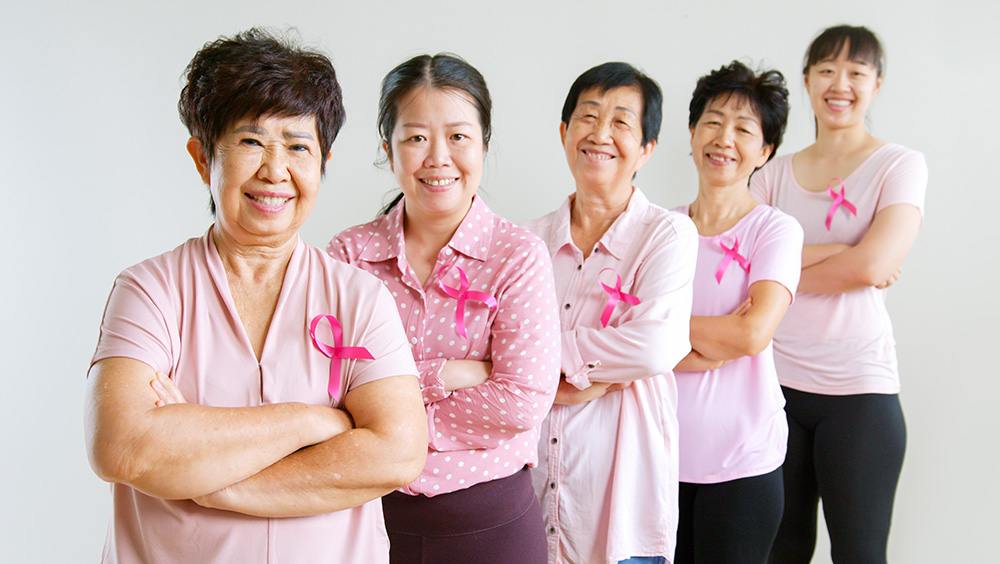
Breast cancer screening should be tailored to each woman to help better detect cancer.
Early detection of breast cancer can save lives. But not every woman is the same, which means not all breast cancer screening should be the same. The American College of Radiology recommends that all women should receive a breast cancer risk assessment by age 25 to determine their breast cancer risk and when they should begin going for screening mammograms. Generally, if you have a family history of breast cancer, you should begin screening for breast cancer 10 years before your youngest family member was diagnosed.
Amanda M. Woodworth, MD, a breast cancer surgeon and director of breast health with Keck Medicine of USC and Henry Mayo Newhall Hospital, shares her advice.
How do you calculate breast cancer risk?
There are several different models used to calculate your lifetime risk of developing breast cancer, and there is no such thing as a perfect model. Most of these models are based on:
- Personal history of previous biopsies and the results
- Exposure to hormones (age when periods started and ended, age when you delivered your first child and whether you took any hormone replacement therapy)
- Family history of breast cancer
The Breast Cancer Risk Assessment Tool (previously known as the Gail Model) is a more simplified tool that can calculate both the five-year risk and lifetime risk of developing breast cancer. The Tyrer-Cuzick Model Breast Cancer Risk Evaluation Tool is often seen as a more accurate tool as it also includes breast density. If you have questions about these online tools, please ask your doctor. At the USC Breast Center at Keck Medicine of USC, we are proud to offer you a risk assessment on your mammography report.
How do we use the breast cancer risk score?
First, we make sure that you do not carry a genetic mutation. If you have a strong family history of cancer, please consider genetic testing. If you carry a genetic mutation, your lifetime risk will be determined based on that mutation. Common mutations include BRCA1, BRCA2 and CHEK2.
Next, we look at the calculated lifetime risk. If it is greater than 20%, you are at higher risk for developing breast cancer.
The breast cancer screening recommendations for women at high risk of developing breast cancer are:
- Maintain a healthy body weight through diet and exercise.
- Once you reach the appropriate screening age, obtain a mammogram and MRI every year. Ideally, you should stagger them so that you are getting imaged every six months.
- Have your breasts examined every six months. Ideally, this will be with a breast specialist and your OB/GYN or primary care physician.
- Limit alcohol use and avoid binge drinking.
Dense breast tissue puts you at higher breast cancer risk
All women have dense breast tissue when they are young, but most women’s breasts become less dense as they age. Dense breast tissue at an older age can be associated with a two- to six-fold increased risk of developing breast cancer in the densest category of breasts.
This is a bigger issue because dense breast tissue shows up as white on mammograms, and so do masses. This means that masses can hide in dense breast tissue on mammograms. Because of this, California passed a law in 2013 stating that women must be notified of their breast density. Last year, the FDA passed a national law, effective this year, requiring that all mammogram reports educate about breast density and inform women of their breast density.
Determining the best breast cancer screening for you
If you have no family history of breast cancer under the age of 50, and no genetic mutation that can put you at risk for breast cancer at a young age, you should start screening at 40 years old. If you are at normal risk, we recommend a mammogram with tomosynthesis (3D mammogram) every year for all women. If you have dense breast tissue, get a whole-breast ultrasound at the time of your mammogram.
If you are high risk, we recommend getting a mammogram with tomosynthesis and MRI every year.
At the USC Breast Center at Keck Medicine of USC, we understand your needs and offer a high-risk clinic to meet all your breast needs. Please call (323) 865-1689 to schedule an appointment with a breast specialist who can tailor your breast cancer screening to you.
Topics
